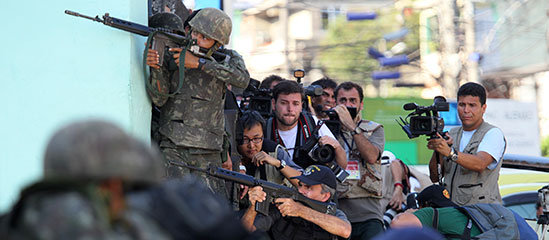Will justice prevail over censorship and violence?
Brazil is home to vibrant media, but journalists are regularly murdered with impunity and critical journalists are subject to legal actions that drain resources and censor important stories. During the 2014 World Cup, this contradiction will be on vivid display. Does Dilma Rousseff’s administration have the will and determination to beat back impunity and end legal harassment, allowing press freedom to thrive? A special report by the Committee to Protect Journalists

Published May 6, 2014
TABLE OF CONTENTS
Brazil has a troubled record on press freedom, but Dilma Rousseff’s administration has recently taken steps, including setting up a working group to investigate attacks on journalists and issue recommendations. Will the government implement the group’s advice? If so, how? And how quickly? By Carlos Lauría
Sidebar: A work in progress
By Fernando Rodrigues
2. The vicious cycle of impunity
Brazil is the 11th deadliest country in the world for journalists, and at least 10 have been murdered in direct reprisal for their work since Dilma Rousseff came to power. Despite a recent flurry of convictions, the violence is mounting, and so is the country’s impunity crisis. By Sara Rafsky
Appendix: Journalists killed in Brazil since January 1, 2011
Widely considered the second biggest problem after violence for journalists in Brazil, “judicial censorship” refers to the practice of politicians, business people, and celebrities using privacy laws to silence the media. The targets of judicial censorship range from major metropolitan dailies and Internet companies like Google to independent bloggers in remote towns. By John Otis
Appendix: The civil code (PDF)
4. The Marco Civil da Internet
Brazil’s landmark law on Internet rights, the Marco Civil da Internet, is far from a perfect piece of legislation, but its journey is instructive for how governments and civil society should approach Internet regulation—and which legislative outcomes are in the best interest of Internet providers and users, including journalists. By Geoffrey King
CPJ’s recommendations to Brazilian authorities.
In other languages: Português
In print: Download the PDF
(Photo by Reuters)